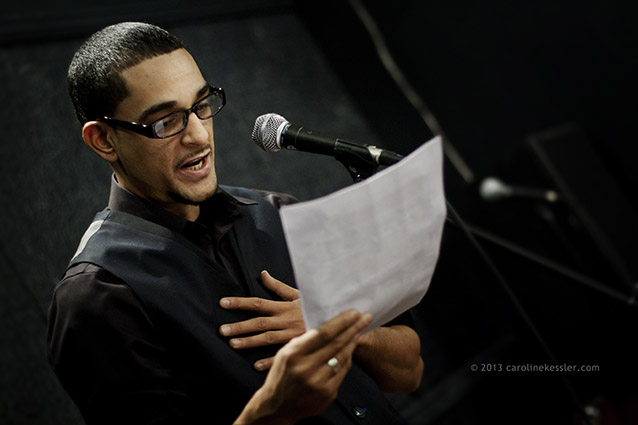It’s Memorial Day weekend and many of us are still in shock from the horrible killings that happened in Santa Barbara. And so, while I turn over the intersection of gun violence, mental illness and misogyny, I turn away too, for comfort, to the places I find hope.
Manuel Boras, photo credit, Life of The Law
So many men and women behind bars are trying to better themselves through education, and these stories are often on page 8 or 23, tucked in a corner of the paper, or at the end of a series of online clicks. But they are hopeful stories about humanity, inspiring us that many people choose change, transforming attitudes and hearts.
“It’s a bitter irony to admit that through imprisonment the world was opened up to me,” said Manuel Boras, who entered the Bard Prison Initiative behind bars and found playwriting enabled him to express himself with words. Now, outside, he recently completed a fellowship through the New York Public Theater’s Emerging Playwrights program and he is working on a play, Starting Over: Coming Home, about the difficulties prisoners and families face upon reentry.
Playwriting seems a natural for people who are trapped but see so much happening around them. They hear dialog that is often unbelievable to those of us on the outside. They see despair, fights, small acts of kindness. They live with a set of values different from that in so-called “civil society” that doesn’t promote expression. But writing does. And programs that offer playwriting to prisoners are more plentiful than you might think. As part of its recognition of prisoner writing behind bars, Pen America gives an award every year to an aspiring playwright. In 2013, it was Derek Trumbo, whose short play Conviction is reproduced online here. Trumbo’s play was performed in New York on March 24th, 2014, by Voices Inside/Out as one of five short prisoner-authored plays at the Engelman Recital Hall of Baruch Performing Arts Center in Manhattan.
Writing plays helps to exercise the mind, said a young prisoner in an article in The Oregonian. Denton, a twenty-four-year old confined to MacLaren Youth Facility in Woodburn, Oregon, struggled with drug addiction—heroin and meth—and was locked away for assault. Behind bars, he found writing. “I think a lot of different things,” he said, and writing is “the only way I can get my visions out.”
In the 1970’s when I lived in California after college, I saw a play written by a playwright in prison that had a huge impact on my life. The play was The Cage by Rick Cluchey. Cluchey got into theatre in 1957, when he was serving a life sentence at San Quentin Prison for armed robbery. He heard about the famed production of Samuel Beckett’s Waiting for Godot put on for the prisoners at San Quentin, but at the time was considered a “security threat,” so did not attend. Only later did he put on his own production of the play behind bars, after he founded the San Quentin Drama Workshop, and his production also touched the prisoners with the notion that Godot never arrives.
Cluchey wrote The Cage in 1965, a year before his life sentence was commuted by then-Governor Pat Brown. It was a drama about the realities of prison life, and once outside, Cluchey found the San Francisco Actors Workshop in 1967 and produced the play, complete with former prisoners from his work behind bars; they toured dozens of campuses across the country in the ’60s and ’70s. That’s how I saw it. It was perhaps the most powerful experience I have ever had in theatre, watching men tell what prison was really like, listening to Cluchey’s words, like Beckett’s, that deal with the human condition. And seeing that cage replicated on stage, a space where no one could exit from.
Per an article in the LATimes, Cluchey’s tours with The Cage led him to Europe, “where in 1976–after years of correspondence and much persistence–he became Beckett’s assistant director for a Berlin staging of Waiting for Godot.” Imagine! A playwright now, a former prisoner sentenced to life and a man working with his hero.
Below is a clip of a production of The Cage re-staged in 1987 at a theatre in L.A. It is not the production I saw with former prisoners who truly captured the devastating cage in their performance like no one else could. But still Cluchey’s words pack a punch and show that he made meaning out of the madness he experienced and was able to turn his life around through art.

